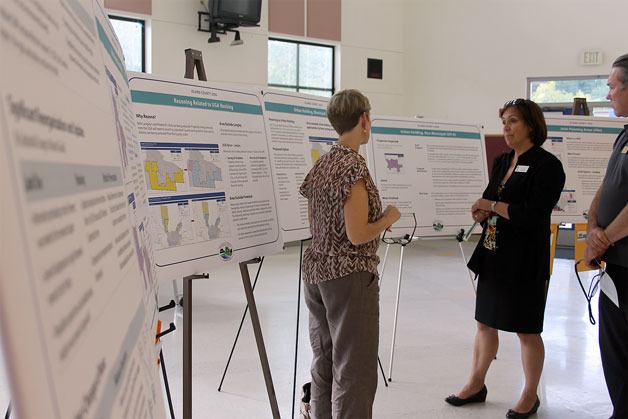South Whidbey residents want affordable housing.
That desire was made clear during Island County Planning and Community Development’s open house on the comprehensive plan Monday at South Whidbey High School. Community members in attendance earmarked housing as the short term priority for the county, or something that needs to be addressed in the next three years.
The open house allowed those in attendance to vote for what they thought the county’s short and long term priorities should be, and collected other written feedback and concerns.
“One of the areas we will have to deal with is housing,” Freeland resident Jerry Hill said. “What could be innovative is to build composite mobile homes where you can add pods to existing homes. The county is way behind on its zoning laws and don’t allow those to be built.”
The open house was set up to involve the community in the planning process, as the comprehensive plan is only a rough draft. There are four open houses scheduled: this one for the South End at the South Whidbey High School commons, Central Whidbey, North Whidbey and Camano Island. County planners will take the comments they receive at the open forums and look to see how the county can incorporate community suggestions into the comprehensive plan.
Portions of the update specifically address slowing growth rates on Whidbey. The plan points out that Island County population growth has decreased every period since 1980, and that the county needs to rework its past projections using census data in order to avoid unnecessary tax dollar expenditures.
“One of our first duties here is using the census data to properly measure our population growth,” Island County Interim Planning Director Keith Higman said. “We didn’t make any drastic changes, but there’s a lot of updating and rewording to make the plan more usable in the next 20 years.”
The other short-term priority for county planners is to better designate and regulate rural lands and critical areas, such as wetlands. The primary goal is to maintain the county’s rural character in the face of urban development, something Island County residents also prioritized at the open house.
Urban growth areas (UGA) and joint planning areas (JPA) boundaries in Langley and Freeland were greatly impacted by the proposed comprehensive plan updates. Large areas of land south of Sixth Street in Langley and areas south of Sandy Point Road were designated as UGAs in the previous comprehensive plan, but most of that land is now being reclassified as rural land due to slowing growth rates. As for Freeland, the areas directly west and east of the southern tip of Holmes Harbor is now reclassified as rural land, when they were classified as rural residential areas in the previous plan.
Island County Senior Planner Beckye Frey said the county wanted the public to be involved in the rezoning process. If residents have any issues with the classification of their land, they have the option to fill out a change request to submit to the county.
To see the proposed UGA boundary revisions, visit http://islandcounty2036.org/resources/urban-growth-areas-and-joint-planning-areas/.
The county’s revisions aren’t final by any means. The changes to the plan are propositions that consider updated county data and the most recent research in areas like environmental science. The county won’t move forward with future planning until it gives the community the chance to give their two cents.
“We will take all the comments from the public and return to the plan with that feedback in the fall,” Frey said. “We will host public hearings in the future regarding the comprehensive plan.”
The next step for the county after integrating the community’s feedback in the fall is to finalize the rezoning maps.
“The comprehensive plan does a lot to determine the character of your community,” Frey said. “It’s one of the areas where anybody gets to make a significant impact on their community.”



